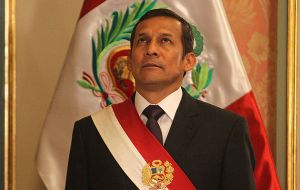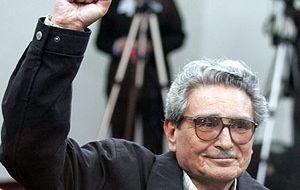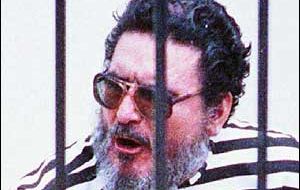MercoPress. South Atlantic News Agency
Peru to punish “negationism”, denying a past of killings and destruction by terrorist gangs
 President Humala a former Army officer was involved in combating terrorism
President Humala a former Army officer was involved in combating terrorism The Peruvian government announced that it will be sending Congress a bill that punishes the negation of the terrorist violence suffered by the country during the last decades of the last century. The bill against “negationism” is in ‘support of democracy and a unified front against terrorism’ which is still active in some parts of the country in alliance with the drug lords.
“The purpose of the bill is to punish those who deny the existence of terrorist violence in recent Peruvian history, and will also give courts national competence to address organized crime plus the creation of a national registry of rapists and paedophiles”, announced cabinet chief Juan Jimenez who took office last 24 July.
“We need to create a national awareness in support of democracy to combat those who deny Peru suffered during several decades the criminal actions of terrorist gangs” said Jimenez.
The proposal against what is described as “negationism” surged following the surfacing of a group of followers and admirers of the founder and head of the terrorist group Shinning Path, Abimael Guzmán, under whose command at least 70.000 people, mainly innocents, were killed and billions of dollars in government and private property destroyed.
The grouping under the heading of Movement for the Amnesty and Fundamental Rights (Movadef) are demanding an amnesty for all former guerrillas who were involved in the two decades conflict between 1980 and 2000 and from which the country is only recovering.
Members of Movadef who deny that Shinning Path was involved in terrorism, have requested their registry as a political party, but were rejected by the Peruvian Electoral Board.
“With the bill we only want to punish those who want to intervene in politics, but denying their past of killings, arson and destruction. We are talking of 70.000 Peruvians killed according to the Truth and Reconciliation Committee that worked with Congress on the issue”, added Jimenez.
The cabinet chief also requested Congress to help with the approval of rules to amend relations with the mining industry, access to water and quality education, all of which are a priority for the government of President Ollanta Humala.
“We remain committed to dialogue and peaceful solutions to controversies, but this does not exclude actions from law enforcement officers or the courts taking action when constitutional rights are ignored or stamped on”, warned the chief minister.
Finally he ratified that the priorities of the current administration are to ensure sustained growth with social inclusion to better the lives of all Peruvians with stability and development.
Peru in the last decade has grown sustainedly in a framework of political stability supported by the mining industry and light manufacturing but the benefits have not trickled down to most of the population, a majority of which living below the poverty line.
Humala’s promise to redress this situation was one of the clues of his electoral victory but he also faces strong resistance from indigenous peoples who fear their sacred lands and water sources are being taken over by foreign mining companies.
One of the decisive disputes in the Conga mining project in the Andes highlands with investments of over 5 billion dollars but which has triggered strong resistance and clashes causing tens of deaths among protestors and police officers. The incidents have toppled two of President Humala’s cabinets.






Top Comments
Disclaimer & comment rules-

Read all commentsInteresting. Of course I support opposition to holocaust denial and have no time for the degenerated fake leftist killers of Shining Path, but this does strike me as a bit authoritarian and a sop to the securocratic right. Peru experts, your thoughts?
Aug 22nd, 2012 - 11:04 pm 0Commenting for this story is now closed.
If you have a Facebook account, become a fan and comment on our Facebook Page!